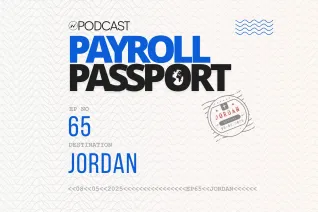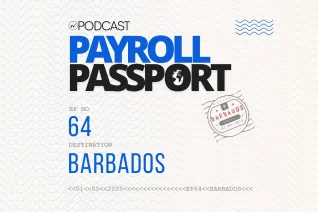Country Spotlight: Payroll in Ireland

Ireland, the Emerald Isle, is known for more than just its scenic beauty. The country was placed 8th on the list of countries with the highest Human Development Index score. And its GDP for 2022 stood at a whopping 529.24 billion USD, making it an ideal place for businesses to explore and expand their talent pool.
But exciting opportunities are often followed by challenges. So is the case with global expansion. As thrilling as it is to set foot in a new country, companies often face the challenge of processing payroll. The same is the case with Ireland. The extensive employment laws and regulations make it complicated for employers to stay on top of payroll compliance. However, here's a ready reckoner for businesses highlighting the essential considerations to ensure a smooth and efficient payroll processing procedure in Ireland.
The Pot of Gold: Taxation in Ireland
The Irish Revenue Commissioners is the governing body for customs and taxation. Established in 1932, it consists of a chairman and two commissioners who oversee tax collection and implementing custom controls.
Ireland follows a ‘Pay As You Earn’ (PAYE) tax system. And while there are several different tax brackets, the amount of tax paid depends on residence status, income, and profession.
All Irish residents must pay income tax. The income tax brackets are fixed at 20% and 40%. However, the rates are subjective with respect to an employee’s marital status and the employment status of their spouse.
Apart from income tax, employees must also contribute to Universal Social Charges (USC). Employees who earn below 13.000 EUR are exempt from paying USC. Other types of income are exempt as well. The USC rate ranges from 0.5% to 8%.
Also Read| Flexible Work Trends 2023 – An EMEA Perspective
Employers and employees must also contribute towards Pay Related Social Insurance (PRSI). It is the main source of funding for social welfare payments in Ireland. The PRSI deduction rate depends on the employee's PRSI class, defined by the Department of Social Protection (DSP).
Irish property owners must also contribute towards Local Property Tax (LPT). It is a self-assessed tax charged on the market value of residential properties. LPT is an annual deduction, usually made on 1 Nov. A person must pay LPT even if they have sold their property between 1 Nov and 31 Oct. However, under certain circumstances, a property may be exempt from LPT.
Employers must also be wary of the Revenue Payroll Notification (RPN), which must be retrieved before running payroll every month. The RPN provides necessary information regarding the deductions that need to be made from Income tax, USC, and LPT.
Organizations unfamiliar with this system must be equipped with a compliant payroll management system that can automatically configure the RPN every month, as failing to do so can result in liabilities.
The Celtic Clock: Irish Work Hours
The average work week in Ireland spans 48 hours and is governed by the Workplace Relations Commission.
Employees can also request band hours. If their contractual working hours differ from their actual working hours over 12 months, they can request to be placed in a specific band of hours.
The employer has certain grounds under which the employer can deny the employee’s request. However, this will not apply to employers who have signed a Collective Bargaining Agreement with their employees.
Beyond the Shamrock
The Irish work landscape is subject to several changes that must be considered while processing payroll. And to ensure accuracy, both in terms of data collection and compliance, organizations must be equipped with an efficient payroll system that can handle the dynamic aspects of payroll.
Fortunately, for hesitant organizations who want to expand their workforce, Neeyamo’s Global Payroll solution is the lucky charm!
Powered by a truly global single engine and its native Global Payroll Tech Stack, this solution provides a holistic and customizable payroll platform. With technology on one hand and compliance on the other, the Global Payroll solution ensures reliable and accurate payroll outputs.
The solution helps organizations manage all their payroll data in a unified platform, allowing seamless integration with other platforms as well. It navigates through complex legislation, relieving companies from the hassle of compliance management and allowing them to focus on their larger goals.
Don’t be “Dublin” your payroll operations, just reach out to Neeyamo.
Latest Resources
Stay informed with latest updates
If you're curious and have a thirst for knowledge pertaining to the HR, payroll, and EOR universe, don't miss out on subscribing to our resources.

















